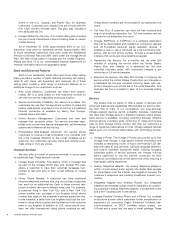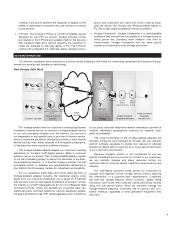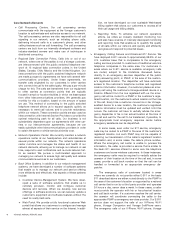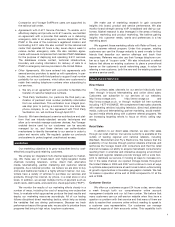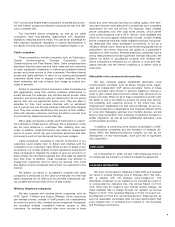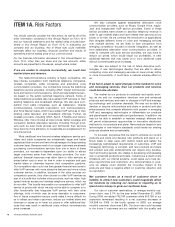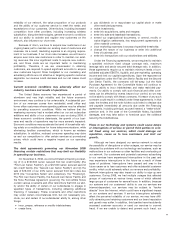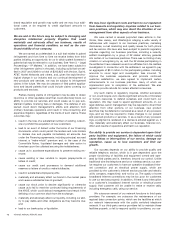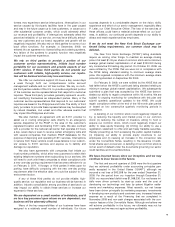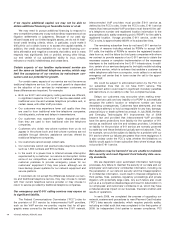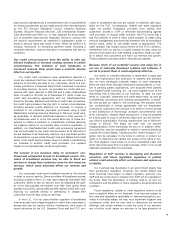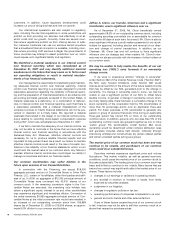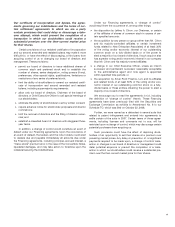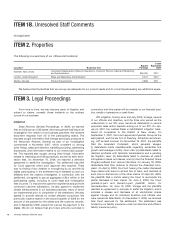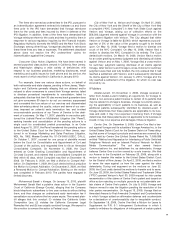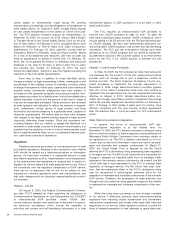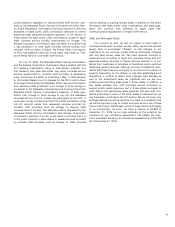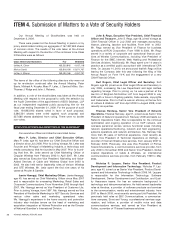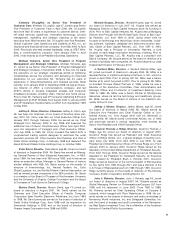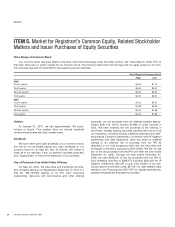Vonage 2009 Annual Report Download - page 22
Download and view the complete annual report
Please find page 22 of the 2009 Vonage annual report below. You can navigate through the pages in the report by either clicking on the pages listed below, or by using the keyword search tool below to find specific information within the annual report.If we require additional capital, we may not be able to
obtain additional financing on favorable terms or at all.
We may need to pursue additional financing to respond to
new competitive pressures or pay extraordinary expenses such as
litigation settlements or judgments. Because of our past sig-
nificant losses and our limited tangible assets, we do not fit tradi-
tional credit lending criteria, which, in particular, could make it
difficult for us to obtain loans or to access the capital markets. In
addition, the credit documentation for our recent financing con-
tains affirmative and negative covenants that affect, and in many
respects may significantly limit or prohibit, among other things,
our and certain of our subsidiaries’ ability to incur, prepay,
refinance or modify indebtedness and create liens.
Certain aspects of our landline replacement service are
not the same as traditional telephone service, which may
limit the acceptance of our services by mainstream con-
sumers and our potential for growth.
For certain users, aspects of our service are not the same as
traditional telephone service. Our continued growth is dependent
on the adoption of our services by mainstream customers, so
these differences are important. For example:
>Both our E-911 and emergency calling services are different,
in significant respects, from the 911 service associated with
traditional wire line and wireless telephone providers and, in
certain cases, with other VoIP providers.
>Our customers may experience lower call quality than they
are used to from traditional wire line telephone companies,
including static, echoes and delays in transmissions.
>Our customers may experience higher dropped-call rates
than they are used to from traditional wire line telephone
companies.
>Customers who obtain new phone numbers from us do not
appear in the phone book and their phone numbers are not
available through directory assistance services offered by
traditional telephone companies.
>Our customers cannot accept collect calls.
>Our customers cannot call premium-rate telephone numbers
such as 1-900 numbers and 976 numbers.
>In the event of a power loss or Internet access interruption
experienced by a customer, our service is interrupted. Unlike
some of our competitors, we have not installed batteries at
customer premises to provide emergency power for our
customers’ equipment if they lose power, although we do
have backup power systems for our network equipment and
service platform.
If customers do not accept the differences between our serv-
ice and traditional telephone service, they may choose to remain
with their current telephone service provider or may choose to
return to service provided by traditional telephone companies.
Our emergency and E-911 calling services may expose us
to significant liability.
The Federal Communications Commission (“FCC”) rules for
the provision of 911 service by interconnected VoIP providers,
such as the VoIP service we provide, require that for all geo-
graphic areas covered by the traditional wire line E-911 network,
interconnected VoIP providers must provide E-911 service as
defined by the FCC’s rules. Under the FCC’s rules, E-911 service
means that interconnected VoIP providers must transmit the call-
er’s telephone number and registered location information to the
appropriate public safety answering point (“PSAP”) for the caller’s
registered location. Vonage provides E-911 service, under the
FCC’s rules, to approximately 98.9% of its subscriber lines.
The remaining subscriber lines do not have E-911 service for
a variety of reasons including refusal by PSAPs to accept VoIP
911 calls, the inability of PSAPs to receive the registered location
data from us, and the failure by third party companies with whom
we contract to provide aspects of our E-911 service to obtain the
necessary access or complete implementation of the necessary
interfaces to the traditional wire line E-911 infrastructure. In addi-
tion, certain of our services designed to be highly mobile including
soft phone service, which is software that enables a customer to
make telephone calls from a computer, route callers to a national
emergency call center that in turns routes the call to the appro-
priate PSAP.
We could be subject to enforcement action by the FCC for
our subscriber lines that do not have E-911 service. This
enforcement action could result in significant monetary penalties
and restrictions on our ability to offer non-compliant services.
Delays our customers may encounter when making emer-
gency services calls and any inability of a PSAP to automatically
recognize the caller’s location or telephone number can have
devastating consequences. Customers have attempted, and may
in the future attempt, to hold us responsible for any loss, damage,
personal injury or death suffered as a result. In July 2008, the New
and Emerging Technologies 911 Improvement Act of 2008
became law and provided that interconnected VoIP providers
have the same protections from liability for the operation of 911
service as traditional wire line and wireless providers. Limitations
on liability for the provision of 911 service are normally governed
by state law and these limitations typically are not absolute. Thus,
for example, we could be subject to liability for a problem with our
911 service where our failures are greater than mere negligence. It
is also unclear under the FCC’s rules whether the limitations on
liability would apply to those subscriber lines where Vonage does
not provide E-911 service.
Our business may be harmed if we are unable to maintain
data security and meet Payment Card Industry data secu-
rity standards.
We are dependent upon automated information technology
processes. Any failure to maintain the security of our data and our
employees’ and customers’ confidential information, including via
the penetration of our network security and the misappropriation
of confidential information, could result in financial obligations to
third parties, fines, penalties, regulatory proceedings and private
litigation with potentially large costs. Any such failure also could
put us at a competitive disadvantage and result in deterioration in
our employees’ and customers’ confidence in us, which may have
a material adverse impact on our business, financial condition and
results of operations.
In early 2009, we completed the process of upgrading our
network, systems and procedures to meet Payment Card Industry
(“PCI”) data security standards, which requires periodic audits,
including an initial audit that was completed in the first quarter of
2009, by independent third parties to assess compliance. PCI
14 VONAGE ANNUAL REPORT 2009


